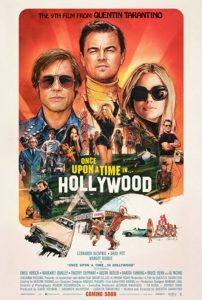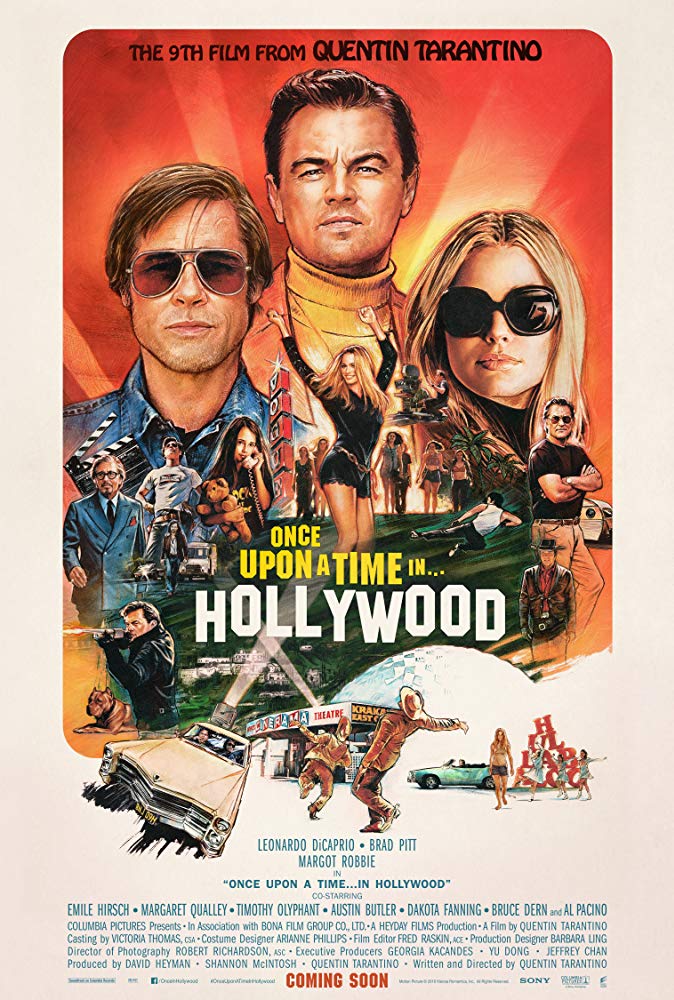 I wish I could say I was a ‘Tarantino fan’. But sadly, I am not. Mostly because I’m generally squeamish when it comes to violence, and decidedly traditional when it comes to story structure. So imagine my surprise at finding several things to genuinely like (or at least, appreciate) in Once Upon a Time in Hollywood, even though it doesn’t have much by way of story and does indeed take a bloody turn, albeit toward the very end of a decently-paced 2 hour, 40 minute epic. Quentin Tarantino films (Reservoir Dogs, Pulp Fiction, Kill Bill, etc.) are still very much an acquired taste, but Once Upon a Time in Hollywood goes down somewhat easier for the non-fan, thanks to the stellar performances of Leonardo DiCaprio and Brad Pitt. They are a joy to watch as fading television western star Rick Dalton (DiCaprio) and his longtime stunt double Cliff Booth (Pitt), two guys struggling to adapt to changing times in “Hollywood” – the place, and the industry – in the summer of 1969.
I wish I could say I was a ‘Tarantino fan’. But sadly, I am not. Mostly because I’m generally squeamish when it comes to violence, and decidedly traditional when it comes to story structure. So imagine my surprise at finding several things to genuinely like (or at least, appreciate) in Once Upon a Time in Hollywood, even though it doesn’t have much by way of story and does indeed take a bloody turn, albeit toward the very end of a decently-paced 2 hour, 40 minute epic. Quentin Tarantino films (Reservoir Dogs, Pulp Fiction, Kill Bill, etc.) are still very much an acquired taste, but Once Upon a Time in Hollywood goes down somewhat easier for the non-fan, thanks to the stellar performances of Leonardo DiCaprio and Brad Pitt. They are a joy to watch as fading television western star Rick Dalton (DiCaprio) and his longtime stunt double Cliff Booth (Pitt), two guys struggling to adapt to changing times in “Hollywood” – the place, and the industry – in the summer of 1969.
In addition to DiCaprio and Pitt, the film features a star-studded ensemble navigating multiple storylines that intertwine real people with a mostly fictional story – a plot device that can be rather confounding, depending on your frame of reference. Dalton and Booth are fictional characters. Yet they interact with the likes of Steve McQueen, James Stacy, Bruce Lee, and Sharon Tate (Margot Robbie), a promising young actress who lives next door to Dalton in the Hollywood Hills. As you may – or may not know or recall, Tate was among several people murdered by Manson Family members on August 9, 1969 at the home she shared with her husband Roman Polanski. That horrific event serves as an implied backdrop for the goings-on in Once Upon a Time in Hollywood, but it’s not the focus of the film. The focus is squarely on Dalton and Booth going about their daily lives, solo and as a brotherly unit, while the audience waits for the proverbial (or literal) axe to fall.
The film presents an odd mix of nostalgia, quirk, humor, horror, satire, melancholy, reality and fantasy. It relies on a sense of anticipation and dread to build the drama, rather than actual dramatic moments, a trade-off that didn’t particularly work for me. I felt invested in the performances, but not in the story, per se.
Aesthetically, Once Upon a Time in Hollywood should satisfy the most discerning of cinephiles. The filmmakers were meticulous in their attention to detail for re-creating the retro vibe – from the type of film and lenses used, to the advertisements on radio, TV, and billboards, to the vintage cars rolling along a replica of Hollywood Boulevard just as it looked in 1969. It’s all quite groovy, right down to a post-credit scene featuring a fake ad for Red Apple Cigarettes (you’ll want to stick around for that).
This has been a popular time to revisit 1969 – with celebrations and retrospectives marking the 50th anniversary of the iconic Moon landing and the peace-and-love music fest Woodstock. The Manson murders represent a seminal cause célèbre of a different kind. What a year indeed.
Once Upon a Time in Hollywood certainly takes a more twisted path in honoring a time gone by. It’s authentic, yet fake. Celebratory, yet violent. Sweet, yet grim. A fairy tale baked in conflicting emotions. It won’t be everyone’s cup of tea. But for some – especially those who embrace the cinematic stylings of Tarantino and/or the Coen Brothers – Once Upon a Time in Hollywood is likely to feel like a masterpiece. You know who you are.
(p.s. special shout-out to child actor Julia Butters who holds her own alongside DiCaprio in a couple of brief yet poignant scenes. She’s definitely one to watch in the years ahead!)
Arty Chick’s take: I’m also not a big Tarantino fan. Too much testosterone for me most of the time. But I agree with Mainstream Chick on this one. Having these two leads and staying away from the uber-violence (mostly) that Quentin loves so much, made for a fun ride. The 60s Hollywood nostalgia and really a wisp of a storyline made it an easy watch. What makes you invest in the film though is the buddy story. The Sharon Tate (Margot Robbie) part is just filler. Same with the Bruce Lee bit, which has gotten a lot of deservedly negative press from Lee’s family. DiCaprio and Pitt have such an easy relationship, you’d watch them reading a phonebook together over a beer. That’s the big reason to see it, IMHO. And I totally agree about Julia Butters. She was a standout.


Amen on the Julia Butters sentiment! She was fantastic!